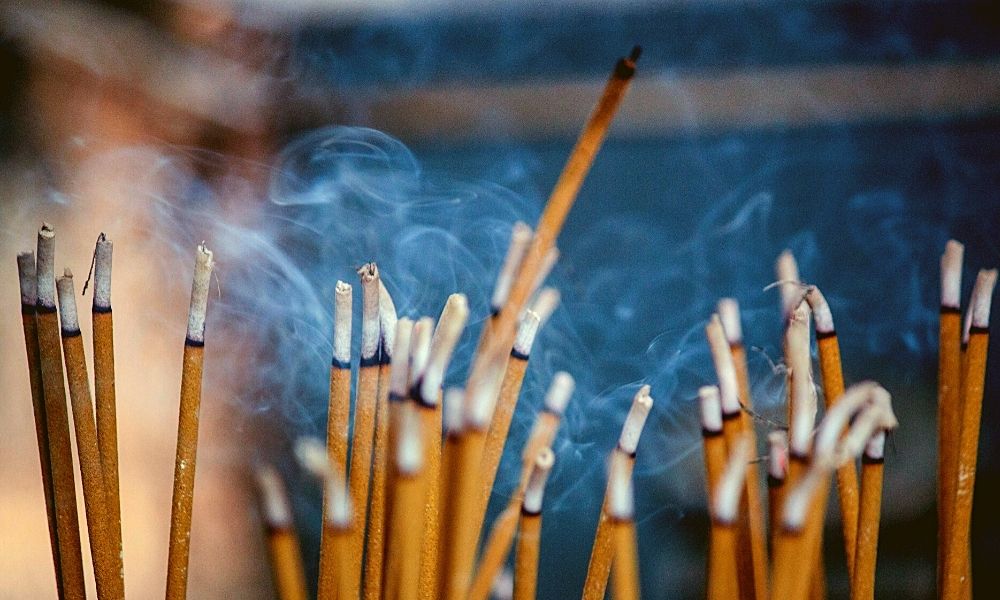
Image Credit: Unsplash
Here's How India Is Making The Agartbatti Industry 'Atmanirbhar'
Writer: Anuran Sadhu
A post grad journalism student of SIMC, Pune with a passion for using words to get my message across in the most unique ways possible and curiosity is the force that drives me to learn and experience more every day.
India, 19 July 2021 3:13 PM GMT | Updated 20 July 2021 3:14 PM GMT
Editor : Madhusree Goswami |
A mountain girl trying to make it big in the city. She loves to travel and explore and hence keen on doing on-ground stories. Giving the crux of the matter through her editing skills is her way to pay back the journalism its due credit.
Creatives : Anuran Sadhu
A post grad journalism student of SIMC, Pune with a passion for using words to get my message across in the most unique ways possible and curiosity is the force that drives me to learn and experience more every day.
According to Khadi and Village Industries Commission, India consumes around a whopping 1,490 tonnes of incense sticks every day. However, only 760 tonnes per day is produced locally.
India is the world's leading producer of incense sticks, also known as agarbatti. There is an unending demand for agarbatti and dhoop products as it is a part of India's tradition and integral to any ritual, with particular importance in the Hindu religion. Agarbatti is generally produced manually in India, employing 4 lakh people, around 80 per cent of whom are women.
According to Khadi and Village Industries Commission (KVIC), India consumes around a whopping 1490 tonnes of incense sticks every day. However, only 760 tonnes per day is produced locally, according to a PIB press release from June 20, 2020. The massive gap in consumption and production led to the import of raw agarbatti in India. Between 2009 and 2019, the import of raw agarbatti increased from 2 per cent to just 80 per cent. In terms of monetary value, India imported incense sticks worth ₹31 crore in 2009, and it increased to ₹546 crore in ten years. The increase in import of agarbatti happened due to the reduction of import duty in 2011 from 30 per cent to 10 per cent, as per KVIC. It resulted in the closure of 25 per cent of incense stick manufacturing units in the country.
Restrictions On Agarbatti Imports In 2019
Due to a significant increase in inbound shipments from countries like China and Vietnam, in 2019, the Modi government put restrictions on imports of agarbatti and other similar products. On August 31, 2019, the Ministry of Commerce placed the import of raw agarbatti under the 'restricted category'. This, in turn, revived several incense stick units in states like Maharashtra, Madhya Pradesh, Uttar Pradesh, Gujarat and several northeastern states. But the move prompted the local traders to import bamboo sticks.
Rise In Import Of Bamboo Sticks
Bamboo is the key material for producing incense sticks. However, due to regulations on bamboo in India, the plants are wild-harvested and not cultivated. Since India had a free trade agreement with Vietnam, as part of the Association of South-East Asian Nations (ASEAN) bloc, imports of bamboo sticks used for incense sticks increased quickly, as per The Economic Times. The import of bamboo sticks increased from ₹ 210 crore in 2018-19 to ₹ 370 crore in 2019-20.
Therefore, to curb the import of bamboo sticks from China and other countries, India hiked the import duty on bamboo sticks from 10 per cent to 25 per cent in 2020. The KVIC welcomed the move as it discouraged heavy imports and amped up local industries in agarbatti manufacturing.
Launch Of KAAM For An 'Atmanirbhar Bharat'
To make India self-reliant, KVIC had submitted KAAM or Khadi Agarbatti Atmanirbhar Mission 2021 to the Ministry of Micro, Small & Medium Enterprises for approval in July 2020. It was approved on August 2, 2020, by the Union Minister for MSME Nitin Gadkari. According to the Ministry of MSME, the programme aimed to create jobs for unemployed and migrant workers across the country and increase domestic Agarbatti production substantially.
KVIC had designed the Khadi Agarbatti Atmanirbhar Mission scheme on Public-Private Partnership (PPP) model to help private manufacturers to scale up their production of incense sticks in the country. As part of the scheme, KVIC provides Automatic Agarbatti making machines and powder mixing machines to the artisans. The machines are locally produced, and the artisans receive them through private Agarbatti manufacturers.
The Benefits Of The Scheme
The scheme further provides a 5 per cent subsidy on the cost of the machines. The remaining 75 per cent is recovered from the artisans in easy instalments every month. The private business partners provide the raw materials for incense sticks manufacturing and also pay the worker's daily wages. However, the workers' training cost is divided between KVIC (75 per cent) and the business partners (25 per cent).
A Sustainable Employment
The scheme requires very little investment to create sustainable employment. For ₹15 per kg of Agarbatti making per person, each artisan can earn a minimum of ₹300 per day when four artisan work on a machine together. For powder making, every artisan can earn a fixed amount of ₹250 per day.
The scheme has been seen as a significant step towards achieving Atmanirbhar Bharat goals. The increased import duty and the introduction of KAAM will boost agarbatti manufacturing in India, generate sustainable employment and reduce the massive gap in consumption and production of incense sticks.
Also Read: Centre Yet To Provide COVID-19 Stimulus Package To 88% MSMEs, Says CIA Survey
 All section
All section














